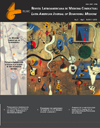Examining the importance of sleep in a U.S.-Mexico border community
Main Article Content
Abstract
In Mexican-American populations, little is known about the extent to which sleep duration is associated with health status, and whether relationships between sleep duration and acculturation are consistent with those found for other lifestyle behaviors and acculturation.
This cross-sectional study used data collected from the San Diego Prevention Research Center’s first community survey. Data were collected from 672 Latino respondents sampled via random digit dialing.
In this primarily female sample (71%), there was a higher prevalence of several health conditions (high cholesterol, asthma, arthritis, and depression) among short (< 6 hours on a typical night) versus long (> 9 hours on a typical night) and mid-range sleepers. Sleep duration was not associated with obesity. Longer sleepers reported watching four more hours of TV compared to mid-range sleepers and three more hours compared with short sleepers. Short sleepers reported living in the U.S. for a greater number of years, and were less likely to complete the interview in Spanish, compared to mid-range and long sleepers.
Short sleepers exhibited a poorer health profile than long and mid-range sleepers; however, long sleepers exhibited more television watching. Additional research is needed on the extent to which these findings hold for other Latino subgroups.
Article Details
Citas en Dimensions Service

Este obra cuyo autor es Universidad Nacional Autónoma de México está bajo una licencia de Reconocimiento-NoComercial-SinObraDerivada 4.0 Internacional de Creative Commons.
Creado a partir de la obra en http://www.revistas.unam.mx/index.php/rlmc.
